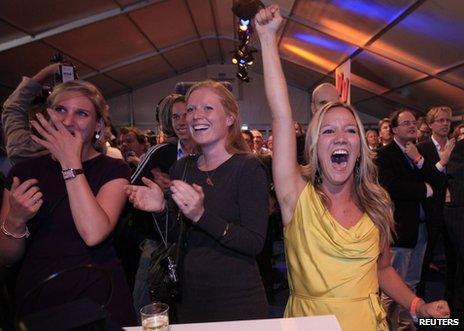Netherlands election analysis: Dutch show faith in Europe
- Published

These VVD supporters cheered in The Hague after hearing exit poll results
These elections were always going to be seen as the first real test of Dutch public opinion on the Netherlands' future relationship with Europe.
It has been a long and strong bond, cemented by the country's strong reliance on the European export market. But the eurozone financial crisis has brought the reciprocity of this union under intense scrutiny.
Many voters are frustrated by what they see as the flow of "blank cheques" being signed off by their leaders and sent to bailout-struggling economies abroad, while austerity is making life harder at home.
The populist, right-wing Freedom Party, led by the ardently anti-European Geert Wilders, offered voters a radical alternative: abandon the union altogether. He implored the nation to stop being "slaves to Brussels" and join his mission to return to the glory days of the guilder, the old Dutch currency.
Dutch dissatisfaction with Europe dominated the pre-election debate.
But ultimately, when voters stood alone in polling booths, facing the choice of where the Netherlands would have the best hope of emerging from the crisis, they placed their faith in Europe.
Uneasy coalition?
Both the centre-left Labour party and the centre-right VVD party won a sufficient number of votes between themselves to rule with a majority in the lower houses of parliament.
But there is no guarantee they will form a government. Both prescribe very different treatments to cure the crisis.
VVD leader Mark Rutte is known as the "Teflon prime minister" for his ability to brush off disasters.
He believes the nation would be best served by a short, sharp, electric-shock-therapy approach, enduring the short-term pain of austerity in exchange for the long-term gains derived from being part of a better European economy.
Labour leader Diederik Samsom won over supporters with his polished performances during a marathon run of televised debates. He takes a more holistic approach.
The former Greenpeace activist wants a "more socially conscious", caring continent, with countries given more time to meet the tough EU budget deficit targets, and some injections of targeted stimulus.
There are parallels with French President Francois Hollande and German Chancellor Angela Merkel, and prospects of an uneasy coalition.
Now is the time for negotiations, the thrashing out of deals and cautious calculations to work out which parties can and cannot work together as part of a coalition.
Whatever form it takes, the new government is unlikely to include the Freedom Party, who caused the collapse of the previous administration.
For now, the Dutch vote will reassure the markets and Brussels that the Netherlands is willing to stay onside.
- Published13 September 2012
- Published12 September 2012
- Published11 September 2012
- Published11 September 2012